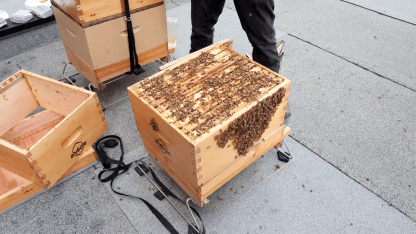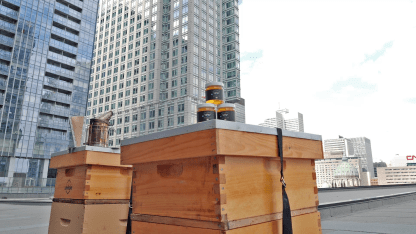The bees can travel approximately 5 km, and they do so regularly to feed on the city's floral life in parks, streets, and yes, even your garden, bringing the pollen and nectar they collect back to the hive for nutrition and honey production.
Why would the Habs want to put these sting-y creatures on their roof, you ask? Well, changing people's opinions of the hard-working insects is one of Alveole's main objectives, and they didn't want to pass up on an opportunity to get some help with that from the 24-time Stanley Cup champs.
"At Alveole, our first goal is to educate people. Our goal with the beehives we have all over town is to help people discover this world, to demystify, and to become a collective beehive," outlined the company's beekeeping specialist charged with looking after the Bell Centre's hives, Simon-Julien Lacroix. "Our goal is to bring people to come inspect the hives with us and familiarize them, and to share our passion with them. And to develop a deeper relationship with these beautiful creatures who can teach us to recenter our thinking, and maybe to seek out new solutions to some of our problems and gain some new perspective on some of the challenges we face."
Founded seven years ago, Alveole operates in 14 cities in Canada and the United States, and counts approximately 400 urban beehives in the Montreal area alone. Alveole is one of many companies and initiatives that have buzzed onto the scene in recent years as interest in tending bees in cities has taken off.
"I think urban beekeeping is on the rise, and for different reasons. From the beekeeping point of view, bees actually fare better than you might think in urban areas. They're less exposed to pesticides than one might expect, and they have more resources," explained Lacroix. "And because it's hotter in the city, they have more resources early and late in the season. There's also more floral diversity, because people garden and that gives them a diverse array of vegetation."
A first harvest was taken in September and resulted in a yield of approximately 30 kg, according to Lacroix. But the work is far from over for the Habs' new black-and-gold friends. As it turns out, these bees are winter bees, and as the days have turned colder, the little workers have been preparing for hibernation by stockpiling resources. Lacroix tells us the hives don't need tending to over the winter, and the hives will be covered up while the busy bees work through their supply for the season.





